小学英语一般现在时三单动词的变化规则及练习题精编版
一般现在时三单动词的变化规则及练习题
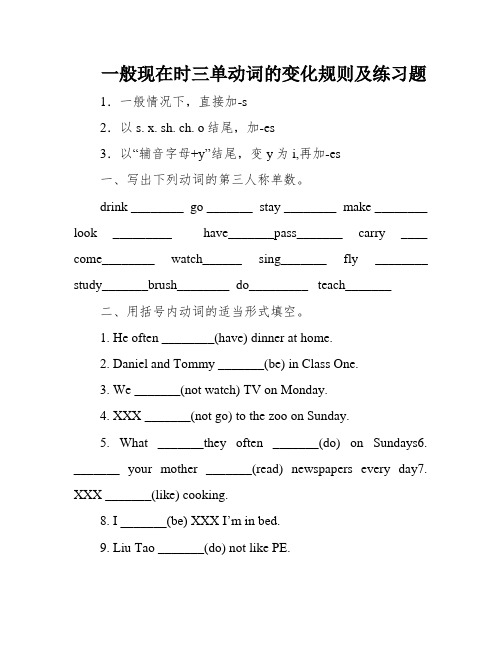
一般现在时三单动词的变化规则及练习题1.一般情况下,直接加-s2.以s. x. sh. ch. o结尾,加-es3.以“辅音字母+y”结尾,变y为i,再加-es一、写出下列动词的第三人称单数。
drink ________ go _______ stay ________ make ________ look _________ have_______pass_______ carry ____ come________ watch______ sing_______ fly ________ study_______brush________ do_________ teach_______二、用括号内动词的适当形式填空。
1. He often ________(have) dinner at home.2. Daniel and Tommy _______(be) in Class One.3. We _______(not watch) TV on Monday.4. XXX _______(not go) to the zoo on Sunday.5. What _______they often _______(do) on Sundays6. _______ your mother _______(read) newspapers every day7. XXX _______(like) cooking.8. I _______(be) XXX I’m in bed.9. Liu Tao _______(do) not like PE.10. The child often _______(watch) TV in the evening.11. Doyou ________(like)_________(run)12. Doeshe_________(like)_________(jump)13. Does Nancy_________(grow)flowers on Saturdayteachers________(like)___________(dance).15. The teacher________(like)____________(dance).16. The students___________(speak) English in class.17. The student_________(speak) Chinese after class.18. Let's___________and play football . ( go )19. He_____________ like swimming . ( not )20. I'm sorry ____________that . ( hear )3、依照请求改写句子1. XXX.(改为否定句)__________________________________________________ _2. I do XXX.(改成普通疑问句,作否认回覆)________________________________________________3. XXX.(改成普通疑问句,做一定回覆)__________________________________________________ _____4. XXX(改成普通疑问句,作否认回覆)___________________________________________________ _____5. We go to school on Sundays.(改成否认句)__________________________________________________ _____四.用所给的人称改写句子。
小学英语一般现在时三单动词的变化规则及练习题(1)

一般现在时三单动词的变化规则及练习题1.一般情况下,直接加-s 2.以s. x. sh. ch. o结尾,加-es 3.以“辅音字母+y”结尾,变y为i, 再加-es一、写出下列动词的第三人称单数drink ________ go _______ stay ________ make ________ look _____ ____ have_______ pass_______ carry ____ come________ watch___ ___ sing_______ fly ________ study_______ brush________ do_______ __ teach_______二、用括号内动词的适当形式填空。
1. He often ________(have) dinner at home.2. Daniel and Tommy ___ ____(be) in Class One.3. We _______(not watch) TV on Monday.4. N ick _______(not go) to the zoo on Sunday.5. What _______they often _______(do) on Sundays?6. _______ your mother _______(read) newspapers every day?7. Mike _______(like) cooking. 8. I _______(be) ill. I’m in bed. 9. Liu Tao _______(do) not like PE. 10. The child often ____ ___(watch) TV in the evening.三、按照要求改写句子1. He watches TV every evening.(改为否定句)___________________________________________________2. I do my homework every day.(改为一般疑问句,作否定回答) ________________________________________________3. She likes books.(改为一般疑问句,做肯定回答)_______________________________________________________ 4. Amy likes playing computer games.(改为一般疑问句,作否定回答) _______________________________________________________ _5. We go to school on Sundays.(改为否定句)_______________________________________________________四、改错(划出错误的地方,将正确的写在横线上)1. Is your brother like English? __________________2. Does he likes swimming? __________________3. He likes play games. __________________4. She don’t do her homework on Sundays. _________________五、把句子补充完整。
完整版)小学一般现在时练习题和答案
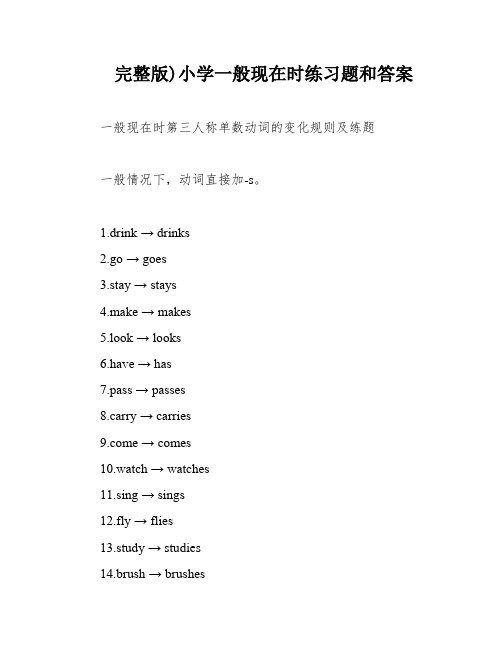
完整版)小学一般现在时练习题和答案一般现在时第三人称单数动词的变化规则及练题一般情况下,动词直接加-s。
1.drink → drinks2.go → goes3.stay → stays4.make → makes5.look → looks6.have → has7.pass → passes8.carry → carriese → comes10.watch → watches11.sing → sings12.fly → flies13.study → studies14.brush → brushes15.do → does16.teach → teaches练题:1.He often has dinner at home.2.Daniel and Tommy are in Class One.3.We do not watch TV on Monday.4.Nick does not go to the zoo on Sunday.5.What do they often do on Sundays?6.Does your mother read newspapers every day?7.Mike likes cooking.8.I am ill。
I'm in bed.9.Liu Tao does not like PE.10.The child often watches TV in the evening.Do you like running?1.Does he like jumping?2.Does Nancy grow flowers on Saturdays?3.The teachers like dancing.4.The teacher likes to dance.5.The students speak English in class.6.The student speaks Chinese after class.7.Let's go and play football.8.He does not like swimming.9.I'm sorry to hear that.三、按照要求改写句子1.He does not watch TV every evening.2.Do you do your homework every day。
一般现在时主语三单的动词变化及练习精编版
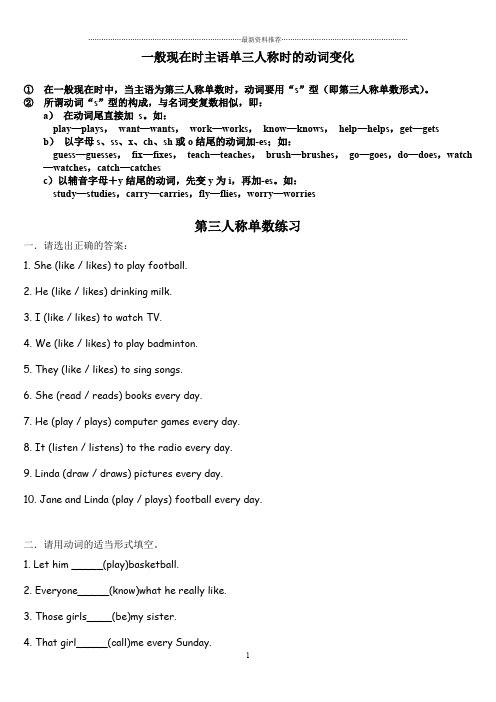
一般现在时主语单三人称时的动词变化①在一般现在时中,当主语为第三人称单数时,动词要用“s”型(即第三人称单数形式)。
②所谓动词“s”型的构成,与名词变复数相似,即:a)在动词尾直接加s。
如:play—plays,want—wants,work—works,know—knows,help—helps,get—getsb)以字母s、ss、x、ch、sh或o结尾的动词加-es;如:guess—guesses,fix—fixes,teach—teaches,brush—brushes,go—goes,do—does,watch —watches,catch—catchesc)以辅音字母+y结尾的动词,先变y为i,再加-es。
如:study—studies,carry—carries,fly—flies,worry—worries第三人称单数练习一.请选出正确的答案:1. She (like / likes) to play football.2. He (like / likes) drinking milk.3. I (like / likes) to watch TV.4. We (like / likes) to play badminton.5. They (like / likes) to sing songs.6. She (read / reads) books every day.7. He (play / plays) computer games every day.8. It (listen / listens) to the radio every day.9. Linda (draw / draws) pictures every day.10. Jane and Linda (play / plays) football every day.二.请用动词的适当形式填空。
1. Let him _____(play)basketball.2. Everyone_____(know)what he really like.3. Those girls____(be)my sister.4. That girl_____(call)me every Sunday.5. How___(do)she_____(spell)the word?6. He________ TV every evening. (watch)7. We always ________ to school on foot. (go)8. Tom, with his classmates, often ______ football after school. (play)9. Your shoes _______ under the bed. (be)10. ______ here and ______ by me. (come, stand)11. His uncle usually _________ to work by bus. (go)12. I always ______ up at six in the morning.(get)13. John ________ like his father. (look)三.请用have或has填空。
小学英语一般现在时三单动词的变化规则及练习题

在句子中,一般现在时三单动词的变化规则可以用来描述事实、表达观点 或传达信息。
通过使用一般现在时三单动词的变化规则,可以使句子更加简洁、明了, 易于理解。
在英语学习中,掌握一般现在时三单动词的变化规则在实际中的应用非常 重要,可以提高语言表达能力。
一般现在时三单 动词的变化练习
题
单选练习题
一般现在时态中,动词第三人称单数的变化规则是:A. 动词原形 B. 动词+s C. 动词+es D. 动词+ing
下列句子中,动词形式正确的是:A. He like playing basketball B. She goes to school at 7:00 every day C. They like to eat apples D. We don't like to play in the rain
在日常交流中的应用
描述日常行为和习惯
表达经常发生的动作或状态
描述事物的性质和特征
表达个人的喜好和意愿
在写作中的应用
描述日常行为和习惯
表达个人观点和喜好
描述事件和经历
编写故事和虚构情境
感谢您的观看
汇报人:XX
下列句子中,动词形式不正确的是:A. He plays basketball every day B. She eats an apple every morning C. They like eat apples D. We don't like to play in the rain
下列句子中,动词形式正确的是:A. He doesn't like to eat vegetables B. She doesn't like playing the piano C. They don't like to read books D. We don't like eating apples
一般现在时动词第三人称单数变化规则讲义与试题
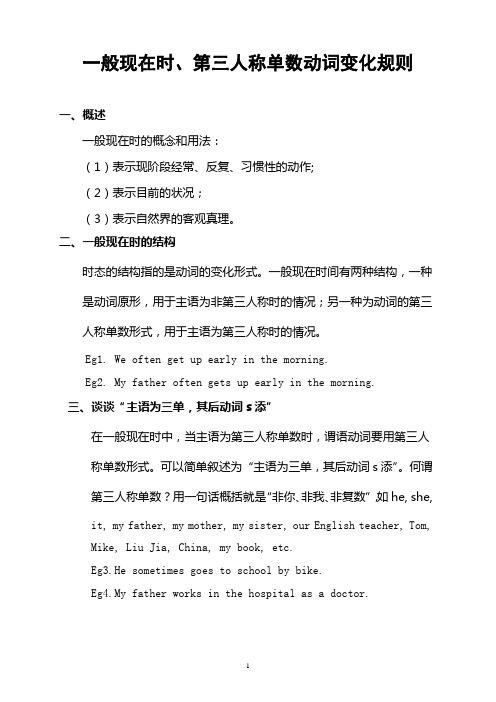
一般现在时、第三人称单数动词变化规则一、概述一般现在时的概念和用法:(1)表示现阶段经常、反复、习惯性的动作;(2)表示目前的状况;(3)表示自然界的客观真理。
二、一般现在时的结构时态的结构指的是动词的变化形式。
一般现在时间有两种结构,一种是动词原形,用于主语为非第三人称时的情况;另一种为动词的第三人称单数形式,用于主语为第三人称时的情况。
Eg1. We often get up early in the morning.Eg2. My father often gets up early in the morning.三、谈谈“主语为三单,其后动词s添”在一般现在时中,当主语为第三人称单数时,谓语动词要用第三人称单数形式。
可以简单叙述为“主语为三单,其后动词s添”。
何谓第三人称单数?用一句话概括就是“非你、非我、非复数”,如he, she, it, my father, my mother, my sister, our English teacher, Tom, Mike, Liu Jia, China, my book, etc.Eg3.He sometimes goes to school by bike.Eg4.My father works in the hospital as a doctor.四、一般现在时的肯定句中,主语为第三人称单数的动词变化主要体现在词尾的变化上,其规律为:(与名词变成复数的变法大致相同。
)五、一般现在时的句子转换(1)当句子中有be动词或情态动词时,则把be动词或情态动词(can,could等等)提到主语的前面变成一般疑问句;在be动词或情态动词后面加not变成否定句.例:①陈述句:She is a student.一般疑问句→Is she a student?否定句→She is not a student.②陈述句:I can swim.一般疑问句→ Can you swim(2)当句子中即没有be动词,也没有情态动词时,则在主语前加助动词do (you,以及复数), does(单数she,he,it)变成一般疑问句;在主语后谓语动词前加助动词don’t(I,you,以及复数), doesn’t(单数she,he,it)变成否定句,助动词后的动词要变成动词原形。
一般现在时动词第三人称单数变化规则讲义与试题
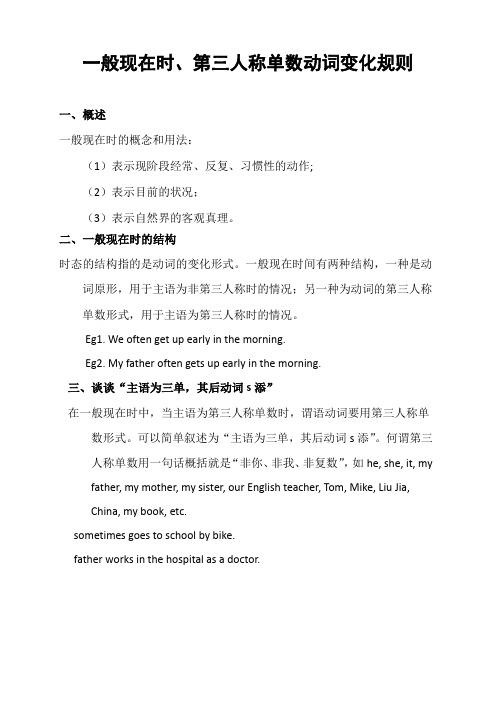
一般现在时、第三人称单数动词变化规则一、概述一般现在时的概念和用法:(1)表示现阶段经常、反复、习惯性的动作;(2)表示目前的状况;(3)表示自然界的客观真理。
二、一般现在时的结构时态的结构指的是动词的变化形式。
一般现在时间有两种结构,一种是动词原形,用于主语为非第三人称时的情况;另一种为动词的第三人称单数形式,用于主语为第三人称时的情况。
Eg1. We often get up early in the morning.Eg2. My father often gets up early in the morning.三、谈谈“主语为三单,其后动词s添”在一般现在时中,当主语为第三人称单数时,谓语动词要用第三人称单数形式。
可以简单叙述为“主语为三单,其后动词s添”。
何谓第三人称单数用一句话概括就是“非你、非我、非复数”,如he, she, it, my father, my mother, my sister, our English teacher, Tom, Mike, Liu Jia,China, my book, etc.sometimes goes to school by bike.father works in the hospital as a doctor.四、一般现在时的肯定句中,主语为第三人称单数的动词变化主要体现在词尾的变化上,其规律为:(与名词变成复数的变法大致相同。
)五、一般现在时的句子转换(1)当句子中有be动词或情态动词时,则把be动词或情态动词(can,could 等等)提到主语的前面变成一般疑问句;在be动词或情态动词后面加not变成否定句.例:①陈述句:She is a student.一般疑问句→Is she a student否定句→She is not a student.②陈述句:I can swim.一般疑问句→Can you swim否定句→I can not swim.(2)当句子中即没有be动词,也没有情态动词时,则在主语前加助动词do (you,以及复数), does(单数she,he,it)变成一般疑问句;在主语后谓语动词前加助动词don’t(I,you,以及复数), doesn’t(单数she,he,it)变成否定句,助动词后的动词要变成动词原形。
小学英语一般现在时三单动词的变化规则及练习题
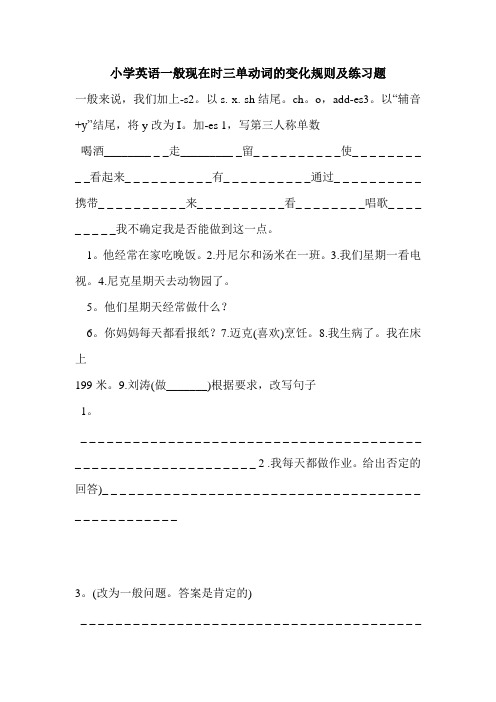
小学英语一般现在时三单动词的变化规则及练习题一般来说,我们加上-s2。
以s. x. sh结尾。
ch。
o,add-es3。
以“辅音+y”结尾,将y改为I。
加-es 1,写第三人称单数喝酒________ _ _走_________ _留_ _ _ _ _ _ _ _ _ _使_ _ _ _ _ _ _ _ _ _看起来_ _ _ _ _ _ _ _ _ _有_ _ _ _ _ _ _ _ _ _通过_ _ _ _ _ _ _ _ _ _携带_ _ _ _ _ _ _ _ _ _来_ _ _ _ _ _ _ _ _ _看_ _ _ _ _ _ _ _唱歌_ _ _ _ _ _ _ _ _我不确定我是否能做到这一点。
1。
他经常在家吃晚饭。
2.丹尼尔和汤米在一班。
3.我们星期一看电视。
4.尼克星期天去动物园了。
5。
他们星期天经常做什么?6。
你妈妈每天都看报纸?7.迈克(喜欢)烹饪。
8.我生病了。
我在床上199米。
9.刘涛(做_______)根据要求,改写句子1。
_ _ _ _ _ _ _ _ _ _ _ _ _ _ _ _ _ _ _ _ _ _ _ _ _ _ _ _ _ _ _ _ _ _ _ _ _ _ _ _ _ _ _ _ _ _ _ _ _ _ _ _ _ _ _ _ _ _ _ _ 2 .我每天都做作业。
给出否定的回答)_ _ _ _ _ _ _ _ _ _ _ _ _ _ _ _ _ _ _ _ _ _ _ _ _ _ _ _ _ _ _ _ _ _ _ _ _ _ _ _ _ _ _ _ _ _ _ _3。
(改为一般问题。
答案是肯定的)_ _ _ _ _ _ _ _ _ _ _ _ _ _ _ _ _ _ _ _ _ _ _ _ _ _ _ _ _ _ _ _ _ _ _ _ _ _ __ _ _ _ _ _ _ _ _ _ _ _ _ _ _ 4。
艾米喜欢玩电脑游戏。
给出否定的回答)_ _ _ _ _ _ _ _ _ _ _ _ _ _ _ _ _ _ _ _ _ _ _ _ _ _ _ _ _ _ _ _ _ _ _ _ _ _ _ _ _ _ _ _ _ _ _ _5 .我们星期天去上学(改为否定句)_ _ _ _ _ _ _ _ _ _ _ _ _ _ _ _ _ _ _ _ _ _ _ _ _ _ _ _ _ _ _ _ _ _ _ _ _ _ _ _ _ _ _ _ _ _ _ _ _ _ _ _ _ _ _ _ _ _ _ _ _ _ _ _ _ _ _ _ _ _ _ _ _ _ _ _ _ _ _ _ _ _ _ _ _ _ _ _ _ _ _ _ _ _ _ _ _ _ _ _ _ _ _ _ _ _ _ _ _ _ _ _ _ _ _ _ _ _ _ _ _ _ _ _ _ _ _ _ _ _ _ _ _ _ _ _ _ _ _ _ _ _ _ _ _ _ _ _ _ _ _ _ _ _ _ _ _ _ _ _ _ _ _ _ _ _ _ _ _ _ _ _ _ _ _ _ _ _ _ _ _ _ _ _ _ _ _ _ _ _ _ _ _ _ _ _ _ _ _ _ _ _ _ _ _ _ _ _ _ _ _ _ _ _ _ _ _ _ _ _ _ _ _ _ _ _ _ _ _ _ _ _ _ _ _ _ _ _ _ _ _ _ _ _ _ _ _ _ _ _ _ _ _ _ _ _ _ _ _ _ _ _ _ _ _ _ _ 2。
小学英语一般现在时三单动词的变化规则及练习题
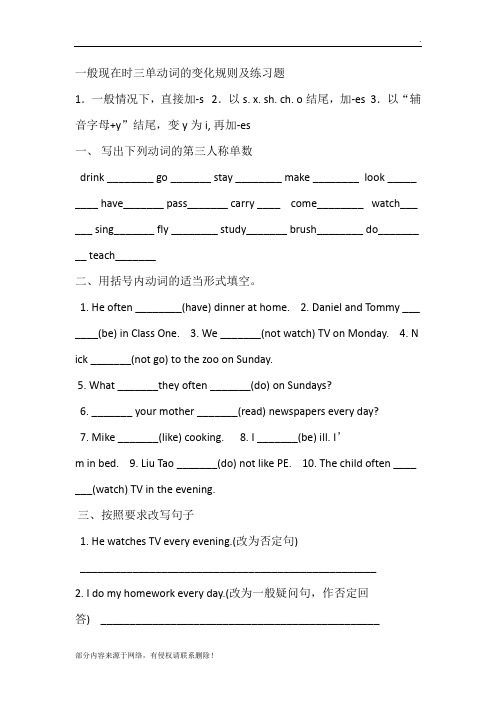
一般现在时三单动词的变化规则及练习题1.一般情况下,直接加-s 2.以s. x. sh. ch. o结尾,加-es 3.以“辅音字母+y”结尾,变y为i, 再加-es一、写出下列动词的第三人称单数drink ________ go _______ stay ________ make ________ look _____ ____ have_______ pass_______ carry ____ come________ watch___ ___ sing_______ fly ________ study_______ brush________ do_______ __ teach_______二、用括号内动词的适当形式填空。
1. He often ________(have) dinner at home.2. Daniel and Tommy ___ ____(be) in Class One.3. We _______(not watch) TV on Monday.4. N ick _______(not go) to the zoo on Sunday.5. What _______they often _______(do) on Sundays?6. _______ your mother _______(read) newspapers every day?7. Mike _______(like) cooking. 8. I _______(be) ill. I’m in bed. 9. Liu Tao _______(do) not like PE. 10. The child often ____ ___(watch) TV in the evening.三、按照要求改写句子1. He watches TV every evening.(改为否定句)___________________________________________________2. I do my homework every day.(改为一般疑问句,作否定回答) ________________________________________________3. She likes books.(改为一般疑问句,做肯定回答)_______________________________________________________ 4. Amy likes playing computer games.(改为一般疑问句,作否定回答) _______________________________________________________ _5. We go to school on Sundays.(改为否定句)_______________________________________________________四、改错(划出错误的地方,将正确的写在横线上)1. Is your brother like English? __________________2. Does he likes swimming? __________________3. He likes play games. __________________4. She don’t do her homework on Sundays. _________________五、把句子补充完整。
(完整版)动词第三人称单数的变化规则及练习.docx

动词第三人称单数的变化规则及练习一、变化规则1、直接在动词后 +s例如:like- likes play-plays2、以 s, x, sh, ch, 接尾的动词: +es例如:wash-washes3、以辅音 +o 接尾的动词: +es例如:go-goes4、以辅音 +y 接尾的动词:变y 为 i+es例如:fly-flies动词短语:+s:Plays, skips, sings, gives, starts, likes,buys some toys, gets up comes back homemakes noodles, eats lunch drinks coffeebegins his class , practises the piano+es :watches TV brushes his teethgoes to bed goes to schooldoes my homework does some readingy→ i+ es: fly→ flies study→ studies注意:不规则变化: have-----has,be-------is,do-----does写出下列动词的第三人称单数drink ________ go _______ stay ________ make ________look _________ have_______ pass_______ carry ____come________ watch______ plant_______ fly ________study_______ brush________ do_________ teach_______二、请看下面两组句子,注意区分他们的共同点和不同点。
I go to school every day.I don't go to school every day.He goes to school every day.He doesn't go to school every day.Do you go to school every day?Yes, I do. (No, I don't)Does he go to school every day?Yes, he does. (No, he doesn't)注:1)第三人称单数用了does 后面就不用动词的s 形式了 ,而用动词原形 .。
一般现在时动词第三人称单数变化规则讲义及试题

一般此刻时、第三人称单数动词变化规则一、归纳一般此刻时的看法和用法:(1)表示现阶段经常、屡次、习惯性的动作 ;(2)表示目前的情况;(3)表示自然界的客观真理。
二、一般此刻时的结构时态的结构指的是动词的变化形式。
一般此刻时间有两种结构,一种是动词原形,用于主语为非第三人称时的情况;另一种为动词的第三人称单数形式,用于主语为第三人称时的情况。
Eg1. We often get up early in the morning.Eg2. My father often gets up early in the morning.三、谈谈“主语为三单,以后动词s 添”在一般此刻时中,当主语为第三人称单数时,谓语动词要用第三人称单数形式。
可以简单表达为“主语为三单,以后动词 s 添”。
何谓第三人称单数用一句话归纳就是“非你、非我、非复数”,如 he, she, it, my father, my mother, my sister, our English teacher, Tom, Mike, Liu Jia, China, my book, etc.sometimes goes to school by bike.father works in the hospital as a doctor.四、一般此刻时的必定句中,主语为第三人称单数的动词变化主要表此刻词尾的变化上,其规律为:(与名词变成复数的变法大体相同。
)规则原形第三人称单数形式get gets1、一般情况下,直接在动词词take takes尾+splay playsguess guessesfix fixes2、以 s, x, sh, ch, o结尾的动词,finish finishes在词尾 + esteach teachesgo 和 do goes 和 doesstudy studiestry tries3、以辅音字母 + y 结尾的动词,fly flies先把 y 变成 i,再加 escarry carriesworry worrieshave has4、不规则动词(特别情况)be is五、一般此刻时的句子变换(1)当句子中有 be 动词或神情动词时,则把 be 动词或神情动词 (can,could等等 )提到主语的前面变成一般疑问句 ;在 be 动词或神情动词后边加 not 变成否定句 .例:①陈述句: She is a student.一般疑问句→Is she a student否定句→She is not a student.②陈述句: I can swim.一般疑问句→Can you swim否定句→I can not swim.(2)当句子中即没有be 动词,也没有神情动词时,则在主语前加助动词do (you,以及复数 ), does(单数 she,he,it)变成一般疑问句;在主语后谓语动词前加助动词 don’t( I,you,以及复数 ), doesn’t(单数 she,he,it)变成否定句,助动词后的动词要变成动词原形。
小学英语一般现在时三单动词的变化规则及练习题

一般现在时三单动词的变化规则及练习题1.一般情况下,直接加-s 2.以s. x. sh. ch. o结尾,加-es 3.以“辅音字母+y”结尾,变y为i, 再加-es一、写出下列动词的第三人称单数drink ________ go _______ stay ________ make ________ look _____ ____ have_______ pass_______ carry ____ come________ watch___ ___ sing_______ fly ________ study_______ brush________ do_______ __ teach_______二、用括号内动词的适当形式填空。
1. He often ________(have) dinner at home.2. Daniel and Tommy ___ ____(be) in Class One.3. We _______(not watch) TV on Monday.4. N ick _______(not go) to the zoo on Sunday.5. What _______they often _______(do) on Sundays?6. _______ your mother _______(read) newspapers every day?7. Mike _______(like) cooking. 8. I _______(be) ill. I’m in bed. 9. Liu Tao _______(do) not like PE. 10. The child often ____ ___(watch) TV in the evening.三、按照要求改写句子1. He watches TV every evening.(改为否定句)___________________________________________________2. I do my homework every day.(改为一般疑问句,作否定回答) ________________________________________________3. She likes books.(改为一般疑问句,做肯定回答)_______________________________________________________ 4. Amy likes playing computer games.(改为一般疑问句,作否定回答) _______________________________________________________ _5. We go to school on Sundays.(改为否定句)_______________________________________________________四、改错(划出错误的地方,将正确的写在横线上)1. Is your brother like English? __________________2. Does he likes swimming? __________________3. He likes play games. __________________4. She don’t do her homework on Sundays. _________________五、把句子补充完整。
动词第三人称单数的变化规则及练习

动词第三人称单数的变化规则及练习一、使用情况:在一般现在时中,当主语是第三人称单数时,谓语动词要用第三人称单数形式,即常在动词原形后加-s或-es。
(标志词usually often always sometimes never every等)二、变化规则1、直接在动词后+s例如:like- likes play-plays2、以s, x, sh, ch, 接尾的动词:+es例如:wash-washes3、以辅音+o接尾的动词:+es例如:go-goes4、以辅音字母+y接尾的动词:变y为i+es例如:fly-flies以元音字母+y接尾的动词后+s例如:play-plays5、除上述规律外,还应注意下面三点:1)动词have ,遇到主语是第三人称单数时,要用has;动词be 的第三人称单数形式是is。
2)含有动词第三人称单数形式的句子变否定句时,要用doesn't + 动词原形,如:He goes to school at six in the morning. (变否定句)→He doesn't go to school at six in the morning.3)对含有动词第三人称单数形式的句子提问时,要用助动词does如:She goes home at five every day. (对划线部分提问)→When / What time does she go注意:不规则变化:have-----has,be-------is,do-----doesI 写出下列动词的第三人称单数(-s)和现在分词(-ing) godoplayjumpswimrunputsingdancecomegethaveflystudyreadwritelookdrinkeatwalklikeII选择1.Ben_____a new book.A. haveB. hasC. havesD. were2.Ben and Mary some books.A. haveB. hasC. areD. were3.I some stories every day.A. haveB. hasC. areD. were4.I __________ ice cream.A.likeB.likesC.likingD.likees5. Kitty__ English every dayA.readB.readesC.readingD.reads6.A man _____in front of his car.A.walkB.walksC.walkingD.work7.Sam’s bicycle ______a bell.A.have B has C.having D.is having8.I every dayA.swimB.swimsC.swimingD.swimes9.He his homework every day.A.doesB.doC.areD.is10. I ________ my homework every day.A.doB.isC.doesD.are11.They ________ their homework every day.A. doB.doesC. isD.are11.Lucy_______with her hands.A.touchB.touchingC.touchesD.touchs12.Superdog________the boysA.seeB.seesC.seeingD.ses13.Supergirl and Superdog______them.A.savesB.saveC.savingD.is saving14.Jack_______their cow.A.sellsB.sellC.sellingD.are selling15.Jack______up the beanstalk.A.getsB.getC.climbD.climbs16.The giant ______boys.A.eatingB.don’t eatC.eatsD.eat17.The goose_______golden eggs.yysyedyes17.The woman_______the beanstalk.A.cutB.cuttingC.are cutD.cuts18.Her mother ______the beanstalk.A.takeB.is take Ctakes D. taking19Jack andher mother _____happerA.doesB.areC.isD. have20.He____the beans in the ground.A.buyB.putsC.putD.buys二.填空:1.She ______(do) homework by herself.2.Jack ______(go) home by bike.3.The giant______(climb) up the beanstalk.4.Her mum ______(run) to the goose.5.He______(do not)like apple.6,Sam______(put) it under his arm.7.The boy_______(chase) it.8.Kitty______(watch)TV everyday.9.He______(feed)them at 8:00 in the morning.10.When ______(do)he get up?11.Grandma Wang___(live) in Pudong.12.The girls___(give) the key to Grandpa.13.That key ______(open) the old box.14.She ______(say) “I like these puppets”.15.What_____(do)Alice find?16.Which toy_____(do) she like?17.He doesn’t______(know)her name.18.John can’t_______(find) his watch.19.Where _____(do)Grandma live?20.How does he______(go)to the post office?三、请看下面两组句子,注意区分他们的共同点和不同点。
(完整版)小学英语一般现在时三单动词的变化规则及练习题
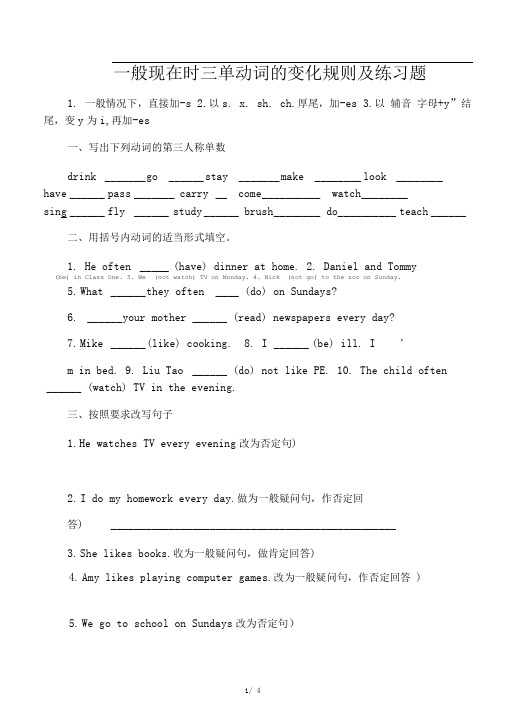
一般现在时三单动词的变化规则及练习题1. 一般情况下,直接加-s2.以s. x. sh. ch.厚尾,加-es3.以辅音字母+y”结尾,变y为i,再加-es一、写出下列动词的第三人称单数drink _______ g o ______ s tay _______ make ________ look ________ have ______ pass _______ carry __ come __________ watch ________sing ______ fly ______ study ______ brush ________ do __________ teach ______二、用括号内动词的适当形式填空。
1. He often _____ (have) dinner at home.2. Daniel and Tommy(be) in Class One. 3. We (not watch) TV on Monday. 4. Nick (not go) to the zoo on Sunday.5.What ______ t hey often ____ (do) on Sundays?6.______ y our mother ______ (read) newspapers every day?7.Mike ______ (like) cooking. 8. I ______ (be) ill. I ’m in bed. 9. Liu Tao ______ (do) not like PE. 10. The child often______ (watch) TV in the evening.三、按照要求改写句子1.H e watches TV every evening改为否定句)2.I do my homework every day.做为一般疑问句,作否定回答) _________________________________________________3.She likes books.收为一般疑问句,做肯定回答)4.Amy likes playing computer games.改为一般疑问句,作否定回答)5.We go to school on Sundays改为否定句)四、改错(划出错误的地方,将正确的写在横线上)1.I s your brother like English? __________________2.Does he likes swimming? __________________3.He likes play games. ____________________4.Shedon ’ tdo her homework on Sundays. _______________五、把句子补充完整。
一般现在时主语三单的动词变化与练习
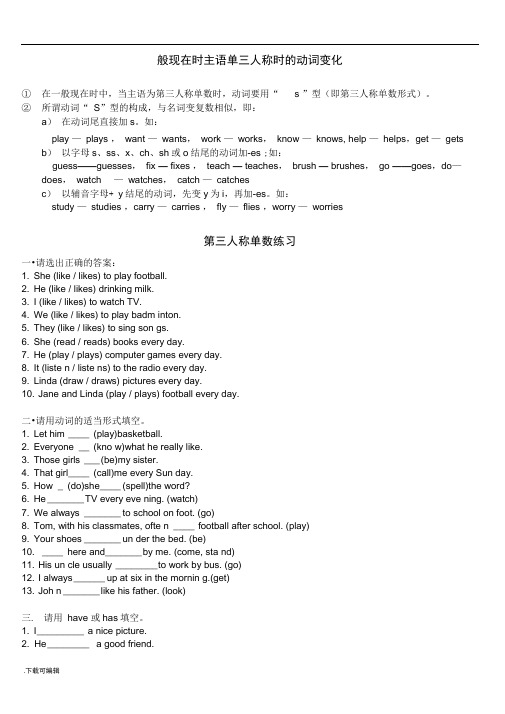
般现在时主语单三人称时的动词变化①在一般现在时中,当主语为第三人称单数时,动词要用“s ”型(即第三人称单数形式)。
②所谓动词“ S”型的构成,与名词变复数相似,即:a)在动词尾直接加s。
如:play —plays ,want —wants,work —works,know —knows, help —helps,get —gets b)以字母s、ss、x、ch、sh或o结尾的动词加-es ;如:guess——guesses,fix — fixes ,teach — teaches,brush — brushes,go ——goes,do—does,watch —watches,catch —catchesc)以辅音字母+ y结尾的动词,先变y为i,再加-es。
如:study —studies ,carry —carries ,fly —flies ,worry —worries第三人称单数练习一•请选出正确的答案:1. She (like / likes) to play football.2. He (like / likes) drinking milk.3. I (like / likes) to watch TV.4. We (like / likes) to play badm inton.5. They (like / likes) to sing son gs.6. She (read / reads) books every day.7. He (play / plays) computer games every day.8. It (liste n / liste ns) to the radio every day.9. Linda (draw / draws) pictures every day.10. Jane and Linda (play / plays) football every day.二•请用动词的适当形式填空。
一般现在时动词第三人称单数变化规则讲义及试题
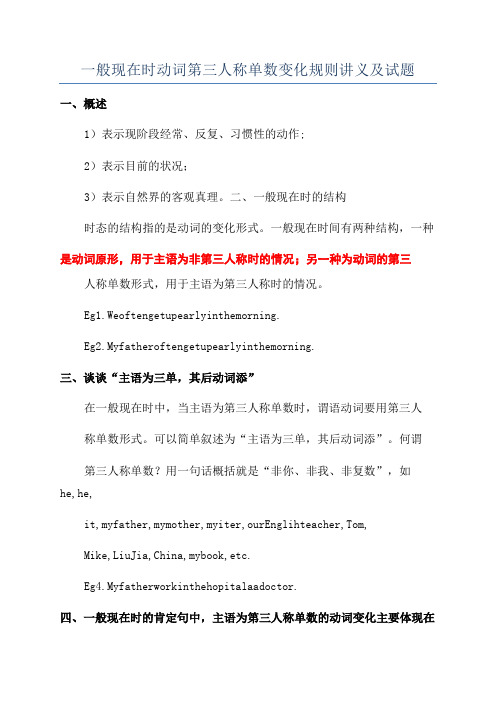
一般现在时动词第三人称单数变化规则讲义及试题一、概述1)表示现阶段经常、反复、习惯性的动作;2)表示目前的状况;3)表示自然界的客观真理。
二、一般现在时的结构时态的结构指的是动词的变化形式。
一般现在时间有两种结构,一种是动词原形,用于主语为非第三人称时的情况;另一种为动词的第三人称单数形式,用于主语为第三人称时的情况。
Eg1.Weoftengetupearlyinthemorning.Eg2.Myfatheroftengetupearlyinthemorning.三、谈谈“主语为三单,其后动词添”在一般现在时中,当主语为第三人称单数时,谓语动词要用第三人称单数形式。
可以简单叙述为“主语为三单,其后动词添”。
何谓第三人称单数?用一句话概括就是“非你、非我、非复数”,如he,he,it,myfather,mymother,myiter,ourEnglihteacher,Tom,Mike,LiuJia,China,mybook,etc.Eg4.Myfatherworkinthehopitalaadoctor.四、一般现在时的肯定句中,主语为第三人称单数的动词变化主要体现在词尾的变化上,其规律为:(与名词变成复数的变法大致相同。
)规则原形第三人称单数形式1、一般情况下,直接在动词词getgettaketake尾+playplaygueguee2、以,,h,ch,o结尾的动词,fifinihfinihe在词尾+eteachteachego和dogoe和doetudytudie3、以辅音字母+y结尾的动词,trytrieflyflie先把y变为i,再加e carrycarrieworrie4、不规则动词(特殊情况)havehabei五、一般现在时的句子转换(1)当句子中有be动词或情态动词时,则把be动词或情态动词(can,could等等)提到主语的前面变成一般疑问句;在be动词或情态动词后面加not变成否定句.例:①陈述句:Sheiatudent.一般疑问句→Iheatudent否定句→Sheinotatudent.②陈述句:Icanwim.一般疑问句→Canyouwim否定句→Icannotwim.(2)当句子中即没有be动词,也没有情态动词时,则在主语前加助动词do(you,以及复数),doe(单数he,he,it)变成一般疑问句;在主语后谓语动词前加助动词don’t(I,you,以及复数),doen’t(单数he,he,it)变成否定句,助动词后的动词要变成动词原形例:①陈述句:Wegetupat7:00everymorning.一般疑问句→Doyougetupat7:00everymorning否定句→Wedon’tgetupat7:00everymorning.②陈述句:Shehaalittlebrother.一般疑问句→Doehehavealittlebrother否定句→Shedoen’thavealittlebrother.哪些主语是第三人称单数?1、人称代词he,he,it;如:HelikewatchingTV.他喜欢看电视。
(完整版)小学英语语法一般现在时及练习题(最新整理)
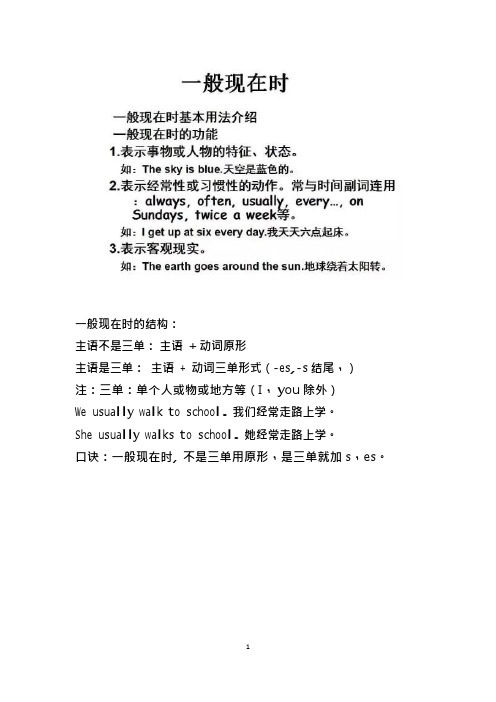
一般现在时的结构:主语不是三单:主语+ 动词原形主语是三单:主语+动词三单形式(-e s,-s结尾,)注:三单:单个人或物或地方等(I, you 除外)W e u s u a ll y w a l k t o s c h oo l.我们经常走路上学。
S h e u s u a ll y w a l k s t o s c h oo l.她经常走路上学。
口诀:一般现在时, 不是三单用原形,是三单就加 s,es。
动词三单形式变化规则1) 一般情况:加-swork—works2) 以s, x, z, sh, ch 或o 结尾: 加-espass—passes, push—pushes,catch—catches, go--goes3) 以辅音字母+y 结尾:改y 为i,加-es(辅音字母是:a,e, i, o, u 以外的字母)fly—flies4) 不规则变化have--has口诀:一般现在时,三单s/es,其他无变化,具体规则要牢记:1)直接加s 2)以s,x,ch,sh,o 结尾+es 3)辅+y,变y 为i,+es 4)特殊情况特殊记,have 变has。
练习题:用所给词的正确形式填空1.W e o f t e n(p l a y)o n t h e p l a y g r o un d.2.H e(g e t)u p a t s i x o’c l o c k.3.y o u(b r u s h)y o u r t ee t h e v e r y m o r n i n g.4.W h a t(do)h e u s u a ll y(do)a f t e r s c h oo l?5.D a nn y(s t u d y)E n g li s h,C h i n e s e,M a t h s,S c i e n c e a n dA r t a t s c h oo l.6.M i k e s o m e t i m e s(go)t o t h e p a r k w i t h h i s s i s t e r.7.A t e i g h t a t n i g h t,s h e(w a t c h)T V w i t h h i s p a r e n t s.8.M i k e(r e a d)E n g li s h e v e r y d a y?9.H o w m a n y l e ss o n s y o u r c l a ss m a t e(h a v e)o n M o n d a y?10.W h a t t i m e h i s m o t h e r(do)t h e h o u s e w o r k?11.H e o f t e n(h a v e)d i nn e r a t h o m e.D a n i e l a n d T o mm y(b e)i n C l a ss O n e.13.W e(n o t w a t c h)T V o n M o n d a y.14.N i c k(n o t go)t o t h e z oo o n S un d a y.15.T h e y(li k e)t h e W o r l d C u p?W h a t t h e y o f t e n(do)o n S a t u r d a y s17.Y o u r p a r e n t s(r e a d)n e w s p a p e r s e v e r y d a y?18.T h e g i r l(t e a c h)u s E n g li s h o n S un d a y s.19.S h e a n d I(t ak e)a w a l k t og e t h e r e v e r y e v e n i n g.20.T h e r e(b e)s o m e w a t e r i n t h e bo tt l e.M i k e(li k e)c oo k i n g.22.T h e y(h a v e)t h e s a m e h obb y.M y a un t(l oo k)a f t e r h e r b a b y c a r e f u ll y.24.Y o u a l w a y s(do)y o u r h o m e w o r k w e ll.I(b e)ill.I’m s t a y i n g i n b e d.26.S h e(go)t o s c h oo l f r o m M o n d a y t o F r i d a y.27.L i u T a o(do)n o t li k e P E.28.T h e c h il d o f t e n(w a t c h)T V i n t h e e v e n i n g.29.S u H a i a n d S u Y a n g(h a v e)e i g h t l e ss o n s t h i s t e r m.30.-W h a t d a y(b e)i t t od a y?-I t’s S a t u r d a y.31.D o n’t m ak e a n o i s e.G r a n dp a(s l ee p).32.T o m’s f a m il y(w a t c h)T V.33.I t(t ak e)m e t w o h o u r s t o f i n i s h m y h o m e w o r k l a s t n i g h t.34.W h a t y o u r m o t h e r(do)e v e r y e v e n i n g?S h e(w a s h)c l o t h e s.35.i t(r a i n)e v e r y d a y?36.W h a t(do)y o u o n S un d a y s?W e(p l a y)f oo t b a ll.37.T h e r e(b e)a f oo t b a ll m a t c h o n T V e v e r y m o r n i n g.38.T h e y o f t e n(v i s i t)t h e G r e a t W a ll.39.W h o(d a n c e)t h e b e s t i n y o u r c l a ss?40.H e(n o t c o m e).41.T h e e a r t h(m o v e)r o un d t h e s un.42S h e(b u y)a s w e a t e r.43.M r.W a n g o f t e n(go)t o S h a n g h a i.二、改句子1.D o y o u o f t e n p l a y f oo t b a ll a f t e r s c h oo l?(肯定回答)2.I h a v e m a n y boo k s.(改为否定句)3.G a o S h a n’s s i s t e r li k e s p l a y i n g t a b l e t e nn i s(改为否定句)4.S h e li v e s i n a s m a ll t o w n n e a r N e w Y o r k.(改为一般疑问句)5.I w a t c h T V e v e r y d a y.(改为一般疑问句)6.D a v i d h a s a go a l.(改为一般疑问句)7.W e h a v e f o u r l e ss o n s.(否定句)8.Nancy doesn’t run fast(肯定句)9.M y dog r un s f a s t.(一般疑问句)(把 10—14 小题变否定句,一般疑问句和划线提问)10.M i k e h a s t w o l e tt e r s f o r h i m.11.I u s u a ll y p l a y f oo t b a ll o n F r i d a y a f t e r n oo n12.S u Y a n g u s u a ll y w a s h e s s o m e c l o t h e s o n S a t u r d a y.13.M i n g m i n g u s u a ll y w a t e r s t h e f l o w e r s e v e r y d a y14.T o m do e s h i s h o m e w o r k a t h o m e.三、写出下列动词的第三人称单数形式:1.wash m a t c h g u e ss studyf i n i s h go s n o w c a rr y2.stop see d r i v e l e tc a rr y k ee p j o i n f i nd t h i n kteach catch3.stay b e g i n forget forgetli e d i e r un p r e f e r g i v er i n g d a n c e h op e四、单项选择:1.T h e r e a n E n g li s h f il m a t t h e c i n e m a n o w.A.w ill h a v eB.i s go i n g t o h a v eC.i s go i n g t o b eD.i s2.T h e p i c t u r e n i c e.A.l oo k sB.i s l oo k e dC.l oo kD.i s l oo k i n g3.S h e do w n a n d s oo n f a ll s a s l ee p.A.li v eB.l a i nC.l a i dD.s i t s4.T h e y t h e o ff i c e i n t i m e v e r y m o r n i n g.A.r e a c h t oB.a rr i v e dC.w e n tD.g e t t o5.W e s h a ll go t o S h a n g h a i o n b u s i n e ss b e f o r e y o u b a c k n e x t w ee k.A.w ill c o m eB.c a m eC.w o u l d c o m eD.c o m e6.T h e p l a n e o v e r t h e r e.A.i sB.a r eC.a mD.w a s7.I s ee h e r t h e r oo m t h i s m o r n i n g.A.t o e n t e rB.e n t e r e dC.e n t e rD.e n t e r s8.T h e t e a c h e r u s t o c o m e t o s c h oo l o n t i m e.A.a s kB.a s k i n gC.a s k sD.a s k e d9.J o hn a l w a y s o t h e r s.A.h e l pB.h e l p i n gC.h e l p sD.t o h e l p10.H e f o r e i g h t h o u r s e v e r y d a y.A.w o r k i n gB.t o w o r kC.w o r k sD.w o r k e d11.Y o u’d b e tt e r a t h o m e a n d y o u r h o m e w o r k.A.t o s t a y,doB.s t a y,doC.t o s t a y,t o doD.s t a y,t o do12.H e s i t s do w n a n d a r e s t.A.h a v i n gB.h a v eC.t o h a v eD.h a s13.U n c l e W a n g n e v e r a c ak e.A.m ak eB.t o m ak eC.m ak i n gD.m ak e s“”“”At the end, Xiao Bian gives you a passage. Minand once said, "people who learn to learn are very happy people.". In every wonderful life, learning is an eternal theme. As a professional clerical and teaching position, I understand the importance of continuous learning, "life is diligent, nothing can be gained", only continuous learning can achieve better self. Only by constantly learning and mastering the latest relevant knowledge, can employees from all walks of life keep up with the pace of enterprise development and innovate to meet the needs of the market. This document is also edited by my studio professionals, there may be errors in the document, if there are errors, please correct, thank you!。
第三人称单数及动词第三人称单数形式变化规则(附练习及答案)
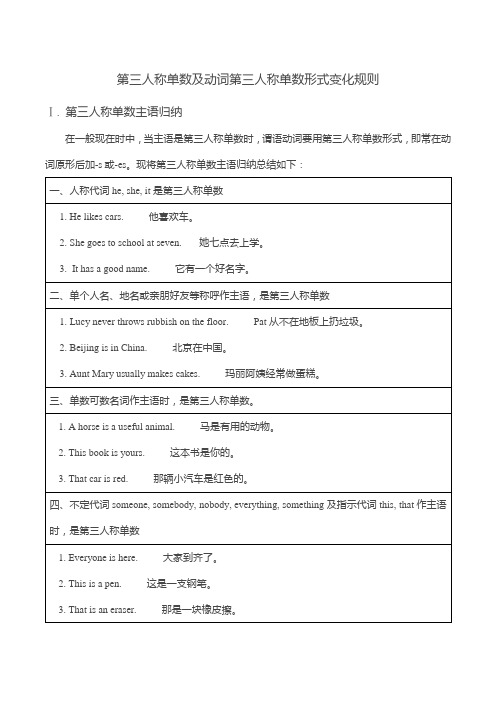
第三人称单数及动词第三人称单数形式变化规则Ⅰ. 第三人称单数主语归纳在一般现在时中,当主语是第三人称单数时,谓语动词要用第三人称单数形式,即常在动词原形后加-s或-es。
现将第三人称单数主语归纳总结如下:Ⅱ. 动词第三人称单数形式变化规则练习及答案一、写出下列动词的第三人称单数。
drink _______ go _______ stay ________ make ________ pass _______ carry_______ come ________ watch _______ fly ________ study_______ brush _______ teach _______ wash_______ guess______ play _______ finish _______二、用括号内动词的适当形式填空。
1. He often ________ (have) dinner at home.2. We _______ (not watch) TV on Monday.3. Nick _______ (not go) to the zoo on Sunday.4. ______ they ________ (like) the World Cup?5. What _______they often _______ (do) on Saturdays?6. _______ your parents _______ (read) newspapers every day?7. The girl _______ (teach) us English on Sundays.8. She and I ________ (take) a walk together every evening.9. There ________ (be) some water in the bottle.10. My aunt _______ (look) after her baby carefully.11. The child often _______ (watch) TV in the evening.12. Su Hai and Su Yang _______ (have) eight lessons this term.答案:一、写出下列动词的第三人称单数。
一般现在时三单动词的变化规则及练习题
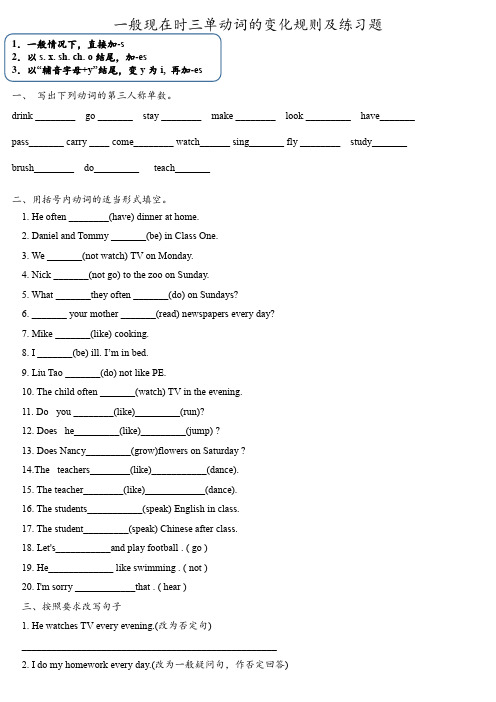
一、写出下列动词的第三人称单数。
drink ________ go _______ stay ________ make ________ look _________ have_______ pass_______ carry ____ come________ watch______ sing_______ fly ________ study_______ brush________ do_________ teach_______二、用括号内动词的适当形式填空。
1. He often ________(have) dinner at home.2. Daniel and Tommy _______(be) in Class One.3. We _______(not watch) TV on Monday.4. Nick _______(not go) to the zoo on Sunday.5. What _______they often _______(do) on Sundays?6. _______ your mother _______(read) newspapers every day?7. Mike _______(like) cooking.8. I _______(be) ill. I’m in bed.9. Liu Tao _______(do) not like PE.10. The child often _______(watch) TV in the evening.11. Do you ________(like)_________(run)?12. Does he_________(like)_________(jump) ?13. Does Nancy_________(grow)flowers on Saturday ?14.The teachers________(like)___________(dance).15. The teacher________(like)____________(dance).16. The students___________(speak) English in class.17. The student_________(speak) Chinese after class.18. Let's___________and play football . ( go )19. He_____________ like swimming . ( not )20. I'm sorry ____________that . ( hear )三、按照要求改写句子1. He watches TV every evening.(改为否定句)___________________________________________________2. I do my homework every day.(改为一般疑问句,作否定回答)________________________________________________3. She likes books.(改为一般疑问句,做肯定回答)_______________________________________________________4. Amy likes playing computer games.(改为一般疑问句,作否定回答)________________________________________________________5. We go to school on Sundays.(改为否定句)_______________________________________________________四. 用所给的人称改写句子。
- 1、下载文档前请自行甄别文档内容的完整性,平台不提供额外的编辑、内容补充、找答案等附加服务。
- 2、"仅部分预览"的文档,不可在线预览部分如存在完整性等问题,可反馈申请退款(可完整预览的文档不适用该条件!)。
- 3、如文档侵犯您的权益,请联系客服反馈,我们会尽快为您处理(人工客服工作时间:9:00-18:30)。
一般现在时三单动词的变化规则及练习题
1.一般情况下,直接加-s 2.以s. x. sh. ch. o结尾,加-es 3.以“辅音字母+y”结尾,变y为i, 再加-es
一、写出下列动词的第三人称单数
drink ________ go _______ stay ________ make ________ look _____ ____ have_______ pass_______ carry ____ come________ watch___ ___ sing_______ fly ________ study_______ brush________ do_______ __ teach_______
二、用括号内动词的适当形式填空。
1. He often ________(have) dinner at home.
2. Daniel and Tommy ___ ____(be) in Class One.
3. We _______(not watch) TV on Monday.
4. N ick _______(not go) to the zoo on Sunday.
5. What _______they often _______(do) on Sundays?
6. _______ your mother _______(read) newspapers every day?
7. Mike _______(like) cooking. 8. I _______(be) ill. I’
m in bed. 9. Liu Tao _______(do) not like PE. 10. The child often ____ ___(watch) TV in the evening.
三、按照要求改写句子
1. He watches TV every evening.(改为否定句)
___________________________________________________
2. I do my homework every day.(改为一般疑问句,作否定回
答) ________________________________________________
3. She likes books.(改为一般疑问句,做肯定回答)
_______________________________________________________ 4. Amy likes playing computer games.(改为一般疑问句,作否定回答) _______________________________________________________ _
5. We go to school on Sundays.(改为否定句)
_______________________________________________________
四、改错(划出错误的地方,将正确的写在横线上)
1. Is your brother like English? __________________
2. Does he likes swimming? __________________
3. He likes play games. __________________
4. She don’t do her homework on Sundays. _________________
五、把句子补充完整。
1.I usually____________________(帮助我的爸爸)
2.I usually_________________________(打篮球)on Sundays.
3.She often____________________________(骑她的自行车)
4.He always_______________________________(做他的家庭作业
根据要求改写句子(1)
1.My seat is near the window. (划线提问)
2. Her brother is a driver. (划线提问)
3.Tom likes music and playing football. (划线提问)
4.The shirt is white. (划线提问)
5.Jim is good at English. (划线提问)
6.He does well in English and maths. (改为否定句)
7.Mike runs as fast as Ben. (改为一般疑问句,否定回答)
8.Are they American girls? (改为单数)
9.Don’t go along(沿着) this street. (改为肯定句)
10.David is my classmate. (划线提问)
11.Turn right at the first crossing(第一个路口). (改为否定句)
12.My maths books are on the sofa. (划线提问)
13.There is my school. (改为一般疑问句,肯定回答)
14.These are his story books. (改为单数)
15.My pencil-case is on the bed. (划线提问)
根据要求改写句子(2)
16.I am from China. (划线提问)
17.That coat is fifty yuan. (划线提问)
18.I am from America. (改为一般疑问句,否定回答)
19.It’s hot in summer. (划线提问)
20.Tom’s sister’s name is Mary. (划线提问)
21.I get to the shopping centre (购物中心)by bus. (划线提问)
22.It always rains in summer there. (改为一般疑问句,肯定回答)
23.It’s cold in winter there. (划线提问)
24.I like fruit (水果)best. (改为否定句)
25.Su Yang is asking Ben some questions(问题). (划线提问)
26.They are going to see a film (电影)tomorrow. (划线提问)
27.I like singing and dancing. (改为否定句)
28.He often cleans his bedroom. (改为一般疑问句)
29.Wnag Bing is heavier (重的)than Gao Shan. (划线提问)
30.Liu Tao is watering flowers in the garden. (划线提问)
31.David and Mike are going to plant trees. (划线提问)
32.Tom jumps as far as Mike. (改为否定句)
33.It is hot in summer in New York. (划线提问)
34.She is an English girl. (改为复数)
35.They are our women doctors. (改为单数)
36.Mary can fly. (改为一般疑问句,否定回答)
37.Ilike playing football. (改成第三人称单数,he)
38.He has a brother. (改为一般疑问句)
39.He does well in Chinese. (改为同义句)
40.My books are on the bookshelf(书架). (划线提问)
41. She does housework at the weekends. (改为否定句)
42. The policeman caught the thief. (改为一般疑问句,作否定回答)
43. I like collecting stamps and singing. (改为否定句)
44. I am a student . (改为一般疑问句)
45. I see a man behind me. (改为一般过去时)。
